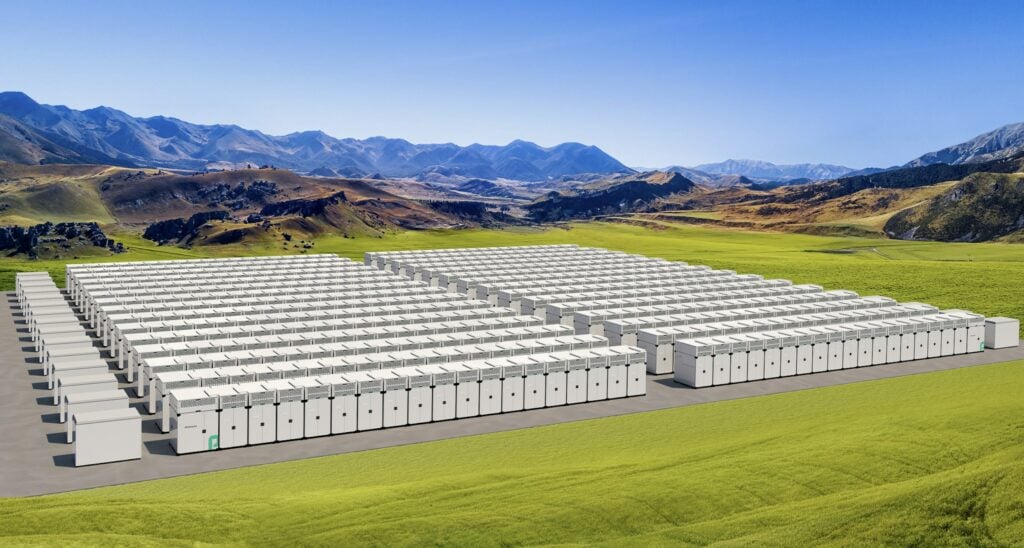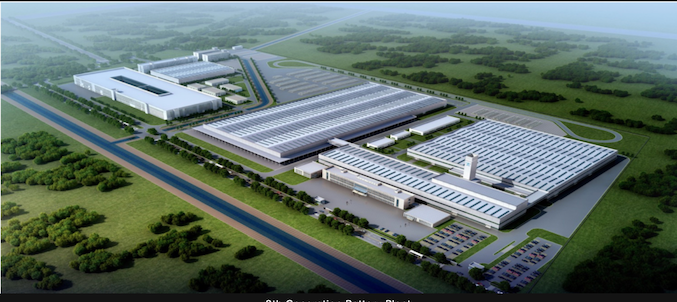
Deals to establish manufacturing and supply of energy storage system (ESS) solutions and components closer to where demand is in the North American market have been signed by Powin Energy and KORE Power.
ESS manufacturer Powin Energy said that from next quarter, its new battery energy storage platform product ‘Centipede’ will be assembled in Monterrey, Mexico, by design, manufacturing and supply chain specialist Celestica.
Enjoy 12 months of exclusive analysis
- Regular insight and analysis of the industry’s biggest developments
- In-depth interviews with the industry’s leading figures
- Annual digital subscription to the PV Tech Power journal
- Discounts on Solar Media’s portfolio of events, in-person and virtual
Meanwhile battery cell and systems manufacturing startup KORE Power, which is building a 12GWh-gigafactory in Buckeye, Arizona, has signed a supply deal for graphite anode materials with high-performance materials producer NOVONIX.
Developing a domestic value chain for lithium-ion batteries has long been a stated policy aim of US President Joe Biden.
Powin nearshoring assembly of BESS platform
Powin Energy is headquartered in Oregon and serves international markets as well as within the US.
Like the vast majority of the rest of the industry, Powin brings in components for assembly and finished products from manufacturing centres in Asia, including the company’s own facilities and partner factories in China and Taiwan.
The new deal with Celestica represents a nearshoring of system assembly, the company said. Celestica will assemble and test Centipede units onsite at its facility before delivery to projects locations.
The integration of assembly and testing into one facility greatly reduces logistical risk and the potential for being suddenly hit with costs related to import tariffs, Powin said.
The North American market represents a large portion of the end-market for Powin’s products, and the nearshoring will give customers the benefit of increased supply chain flexibility and responsiveness, the company hopes.
“Our partnership with Celestica marks a significant step in Powin’s plans to simplify and secure our supply chain for our North American customers, and we are confident in Celestica’s ability to uphold our focus on safety and reliability for our customers,” Powin Energy CEO Geoff Brown said.
Brown added that the deal with an assembly partner with “global scale and capabilities” gave his company the flexibility to further expand international production in future.
Powin launched the Centipede modular platform in November last year. It enables the end-to-end stacking of the company’s Stack750E battery energy storage system (BESS) units and can fit over 200MWh of capacity within a single acre footprint.
Powin executive VP Danny Lu recently told Energy-Storage.news the launch of Centipede represents the move from container-based enclosure systems to “modular, outdoor-rated energy storage racks”.
Taking part in our ‘Year in review 2021’ blog series of interviews with leading energy storage industry companies, Lu acknowledged that supply chain constraints had been challenging during last year — as did respondents from Fluence, Stem Inc, law firm Stoel Rives and others.
The company said yesterday that its vertically integrated business model, supply chain diversification and full control it retains over product design enabled it to create the agreement with Celestica. Powin also buys individual components from a range of different vendors.
Powin’s racks and storage systems use lithium iron phosphate (LFP) cell chemistry batteries. Its main battery cell supplier is major Chinese manufacturer CATL, with which it has a multi-year master supply agreement in place.
In August last year, as Powin announced a cell supply deal with another Chinese maker, EVE, Danny Lu told the site there is a lack of approved cell suppliers to serve the US energy storage market at present.
With almost all LFP batteries globally produced by China, the “lack of mature upstream component suppliers makes competitively priced US-based production of LFP battery cells difficult to source,” he said.
While Powin is trying to convince cell vendors to move production to the US, or expand current production of cells within the country, Lu said the “percentage of premium customers are willing to pay, for US-made products,” is the “unknown factor”.

KORE Power’s exclusive supplier for graphite anode material
KORE Power is one such potential supplier, focused on design and manufacture of proprietary nickel manganese cobalt (NMC) as well as LFP cells as well as its own battery management system (BMS).
Currently manufacturing in China through its partners there, KORE is building its 12GWh Arizona KOREPlex facility to serve sectors including stationary energy storage, e-mobility and industrial systems.
The factory is expected to start producing in 2023 and when it is fully ramped up will require nearly 12,000 tonnes of graphite anode material annually.
In the deal provisionally agreed in a letter of intent with supplier NOVONIX and announced at the beginning of this week, NOVONIX will invest in KORE Power and acquire a 5% stake, buying 3.33 million shares at US$7.5 each, as well as becoming its exclusive suppler of the material.
The deal will close in the early part of this year, subject to company approvals from both parties, definitive documentation and customary conditions.
The two companies have already been working together since 2019, with NOVONIX validating and testing KORE’s cell technologies.
‘Diverse supply chain can mitigate risks’
In an online event hosted by the US Department of Energy last year, KORE Power CEO and co-founder Lindsay Gorrill emphasised to Secretary of Energy Jennifer Granholm the importance of domestic cell manufacturing and design in establishing a strong value chain for batteries in the US.
Gorrill pointed out that not only was that a challenge, but also a big opportunity, with grid storage “the missing link of a real green world”.
“This partnership represents a natural fit for two companies committed to establishing a North American battery sector and facilitating a sustainable future,” he said this week of the deal with NOVONIX.
“The booming US market is leading the global transition to grid-scale battery systems, and with the support of NOVONIX, we’re energised to work towards building a secure domestic supply chain for energy storage.”
As has been pointed out many times, the rapid growth of demand for electric vehicle batteries presents a challenge for the ESS market to secure its own supply of components and products worldwide. Efforts like those announced by Powin and KORE are steps towards addressing this dynamic as well as bringing production geographically — and some would argue politically — closer to home.
EV battery production is rightly a focus, but with the expected boom in ESS demand in the US, already evidenced by the market rapidly moving from a gigawatt-plus in 2020 to multiple gigawatts in 2021, further industry-specific efforts will be required. Recent modelling from the National Renewable Energy Laboratory (NREL) indicated that as much as 6TWh of energy storage will be needed to decarbonise the US energy sector by 2050.
In the interim, the American Clean Power Association — into which the national Energy Storage Association merged at the beginning of this year — continues to call for 100GW of grid storage by 2030 in the US.
“A diverse energy storage supply chain can help mitigate risks for US companies working to deploy 100GW of new energy storage by 2030,” Jason Burwen, former ESA interim CEO and now VP of Energy Storage at the American Clean Power Association said yesterday of Powin’s Celestica announcement.
“Powin is taking a leadership position, commissioning plants with our trade allies and working toward partnerships to bring storage system manufacturing and cell production to US-based facilities.”

